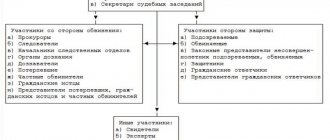Subject and science of criminal enforcement law
Criminal executive law
(ECL) is a system of norms established by the state in accordance with the requirements of penal policy that regulates social relations in the process of executing criminal penalties, establishes objectives, principles, general provisions, procedures and conditions for serving sentences, and the application of basic principles to convicted persons. means of correctional and educational influence. Today, the prevailing idea is that criminal executive law is an independent branch, part of the legal system of the Russian Federation.
The science of criminal law
– this is the result of human activity to systematize and accumulate knowledge about penal law and its implementation (carrying out) in the law enforcement activities of public authorities executing punishment.
The main task of the science of penal law is to theoretically ensure the improvement of the execution of punishments.
Criminal-executive law is divided into General and Special parts.
a common part
determines the goals, objectives, principles, system and structure of penal legislation, the legal status of convicts, the system of penal bodies and control over their activities.
Special part
determines the procedure and conditions for the execution and serving of specific types of sentences, as well as the grounds and procedure for release from punishment and control over those released and conditionally convicted.
The subject of criminal executive law
are social relations that develop in the process of execution and serving criminal sentences.
The subject of the UIP
includes state policy in the field of execution of criminal punishment; the structure of the norms of the branch of law under consideration; the legislative system and its sources; criminal law of foreign countries, international legal standards for the treatment of convicted persons and crime prevention; practice of execution of punishment and correction of convicts, etc.
Activities of criminal-executive law
Criminal law
- an independent branch of Russian law falling under the jurisdiction of the Federation, which is characterized by its own subject, method, as well as a separate system of norms that establish the goals, principles, directions, main forms and means of implementing state policy in the field of execution of criminal penalties.
Criminal enforcement activities
This is the final stage of law enforcement. The effectiveness of many government bodies depends on its effectiveness: legislative, executive, judicial. The penal system is designed to perform many social tasks. Criminal-executive legislation and the practice of its application are one of the generally recognized and actually effective means of influencing crime and controlling its condition in modern conditions.
In modern conditions of operation of the Criminal Code of the Russian Federation and the corresponding Penal Code of the Russian Federation, there has been an expansion of the subject of criminal executive law. In accordance with Art. 2 of the Penal Code of the Russian Federation, the expansion of the subject of criminal executive law is associated with the following forms of regulation of social relations:
a) with the execution of all types of punishments and other measures of criminal law provided for by the Criminal Code of the Russian Federation (compulsory measures of a medical and educational nature), on the basis of the principles, rules and procedures established by law;
b) with the application of the prescribed means of correction to convicted persons;
c) with regulation of the activities of institutions and bodies executing punishments;
d) with the procedure for the participation of state authorities and local governments, other organizations, public associations;
e) with the procedure for release from punishment and assistance to released persons.
The independence of any branch of law is characterized by the presence of its own method of legal regulation of relations. In Criminal Executive Law, the main method is the imperative method, which presupposes inequality of subjects of legal relations.
Penal policy
State policy significantly influences the formation and development of the legal system, various branches of legislation, and legal forms. It forms the basic principles, strategy, directions and forms of achieving social goals.
The fight against crime occupies an important place in the state policy of the Russian Federation. There are criminal and penal policy
and
crime prevention policies
. This division is conditional, since individual policy areas can either be combined with each other or separated. Penal policy is closely related to criminal policy.
Penal policy
determines the goals and objectives, principles and main directions, forms and methods of state activity to ensure the execution of punishment, correct the convicted and prevent them from committing new crimes. It is based on provisions developed by the international community on the treatment of convicted persons.
Penal strategy
policy is to democratize the activities of correctional institutions, to define new types of criminal penalties alternative to imprisonment, and to involve society in the correction of convicts.
Subjects of policy formation in the field of execution of punishments
are the President and the Federal Assembly of the Russian Federation. So, according to Part 3 of Art. 80 of the Constitution of the Russian Federation, the President determines the main directions of the internal policy of the state. Policy in the field of combating crime (part of which is policy in the field of execution of punishment) is an integral part of the internal policy of the state.
Penal policy is implemented in the activities of the relevant state bodies of the penal system (Ministry of Justice of the Russian Federation, Department of Bailiffs, institutions and bodies entrusted by law with the execution of criminal punishment, etc.). The implementation of policies in this social sphere is also entrusted to other state bodies.
Main institutions of the penal system
As mentioned above, the penal system includes a huge number of correctional institutions. To better understand the work of the penal system, you need to consider them in more detail:
- Colony settlement. Today there are two forms of such institutions. The first is intended for convicts who have committed crimes through negligence or persons sentenced to a term of no more than five years. Most often these are citizens who have committed a transport crime. The second type of penal colony is intended for persons who have proven themselves positively at their previous place of serving a prison sentence. A convicted person can receive such a transfer only after a certain period has expired. Such colonies, in fact, do not deprive the convicted person of freedom, but only limit it. During the day, free movement without security is allowed in the settlement colony, it is possible to leave the territory for various reasons, possession of valuables and money is allowed, and living with family is allowed;
- General regime colony. Most often, such institutions house men convicted of crimes of varying severity. It also houses criminals convicted of crimes committed through negligence and serving a sentence of more than 5 years. General regime colonies contain the overwhelming majority of those sentenced to serve their actual prison sentences;
- Maximum security colony. People who have committed particularly serious crimes end up here;
- Special regime colony. Most often, people who were not sentenced to death because a moratorium was imposed on it are serving their sentences in such institutions. Prisoners are kept in a cell.
Speaking about the structure of the penal system, it is necessary to additionally mention correctional centers. People sentenced to administrative arrest are held here. They cannot be put on the same level as colonies. Nevertheless, today there are the most such divisions of the penal system.
Factors influencing the formation of penal policy
The formation of penal policy is influenced by the following factors: the socio-political and economic state of society; state of morality, presence of ideology; level of legal consciousness; state of crime; recognition of international instruments on human rights and treatment of prisoners; activities of international organizations; the state of civil society; science achievements.
First of all, penal policy largely depends on the moral state of society
, on the level of his legal consciousness. If social relations worsen and the moral foundations of society weaken, then this leads to an exacerbation of contradictions between people, forms negative views of convicts, which inevitably negatively affects the formation of penal policy. It becomes more rigid, and its goals and principles are practically not realized.
The economic state of society has the most direct impact on penal policy.
.
In an economically strong state, higher goals are set, the strategy becomes fundamental, and the main forms and methods of its implementation do not depend on political factors and the situation.
Another factor influencing the formation and development of penal policy is the state of crime
. A stable crime rate or its decline makes policy in this area, as a rule, more humane. The growth of serious and, above all, violent crimes negatively affects moral and legal ideas in society and stimulates tougher political and legal decisions.
Penal policy is enshrined in various forms, and above all, in penal legislation. Currently, it is enshrined in the Criminal Executive Code (EC), as well as in other federal laws and regulations - decrees of the Government of the Russian Federation on issues related to the execution of punishment (food for convicts, medical and household support).
Principles of penal law
There are three groups of principles of criminal-executive law: general legal; intersectoral; industry.
I. General legal principles:
democracy, legality, humanism.
1. Under the principle of democracy
management of correctional institutions is built on the basis of democratic centralism.
2. Principle of legality
is expressed in the strict observance and exact execution of laws and regulations by all bodies, institutions and officials executing punishment.
3. The principle of humanism
is expressed in the establishment of humane conditions for serving a sentence and is manifested in a fair attitude towards convicts, respect for their honor and dignity.
II. Cross-sectoral principles:
equality of convicted persons before the law; differentiation and individualization of execution of punishments.
1. The principle of equality of convicted persons before the law
lies in the uniform legal status of persons serving a specific type of punishment or who are under the same conditions for serving a sentence.
2. Principle of differentiation
reflects the need to distribute the entire mass of convicts into homogeneous categories by type of correctional institution: citizenship; semi; age; the gravity of the crime committed; criminal record.
3. Principle of individualization
is expressed in the requirement of a strict individual approach to each convicted person, that is, the choice of measures of influence necessary for this particular convicted person.
III. Industry principles:
rational use of coercive measures, means of correction of convicts; encouraging law-abiding behavior; combining punishment with corrective action.
1. The principle of rational use of coercive measures and means of correction of convicts
consists, on the one hand, in the minimality and gentleness of repression, on the other hand, in its sufficiency and proportionality.
2. With the principle of stimulating law-abiding behavior
incentive norms are applied to improve the legal status of convicts.
3. The principle of combining punishment with corrective action
represents a wide range of educational activities: educational work, labor, general education and vocational training.
Responsibilities of the penal system
Along with the functions of the penal system, responsibilities also need to be considered separately. Many people believe that penitentiary institutions function only to convict the criminal and control his detention in places of deprivation of liberty. In fact, the tasks of the penal system are much broader. The main responsibilities of the penal system include:
Assignment of a type of correctional institution to those sentenced to imprisonment under the Criminal Code of the Russian Federation, Article 58
- maintaining order in places of execution of punishments;
- development and determination of the most effective methods of correction of prisoners;
- protection of the legal rights of wards;
- assistance in socialization.
The modern penitentiary system and international law are constantly being reformed. The main point of the reforms is to create more humane conditions for keeping criminals in custody.
The key principles of work of penal system employees are based on:
- legality. The relationship between penal system employees and wards is determined exclusively by law;
- humanism. Violent actions against wards and humiliation of their dignity are not allowed;
- equality. All people are equal before the law;
- individualization of applied corrective measures. In simple words, correctional system employees must study in detail the individual character traits of the ward and try to correct him based on the results obtained.
The sectoral principle also matters. This means that punishment always goes hand in hand with correction. There are a lot of different activities for educational work with a convicted person - from occupational therapy to vocational training.
Principles of legality and humanism
In the general theory of law, principles are defined as the basic ideas of law, the guiding provisions of the legal system. In Art. 8 of the Penal Code of the Russian Federation lists the principles on which the penal legislation of the Russian Federation is based.
Principle of legality
– constitutional.
It is enshrined in a number of articles of the Constitution of the Russian Federation (Articles 4, 13,15,17–19, etc.) and international documents. In criminal executive law, the principle of legality is expressed in the supremacy of the law governing the execution of punishment, and its priority
over other normative legal acts regulating public relations in this area. The principle of legality is reflected in Chap. 2 tbsp. 10–15 of the Criminal Code, which determine the legal status of convicted persons, in Ch. 3 tbsp. 19–23 of the Penal Code, establishing a system and forms of control over the activities of institutions and bodies executing punishment.
The principle of humanism
enshrined in many institutions and norms of the penal code, international acts on human rights and on the treatment of convicted persons. For example, in Art. 10 of the International Covenant on Civil and Political Rights it is formulated as follows: “All persons deprived of their liberty have the right to be treated with humanity and respect for the inherent dignity of the human person.” In ch. Article 12 2 of the Penal Code states that convicts “must not be subjected to cruel or degrading treatment. Coercive measures against convicted persons can only be applied on the basis of the law.”
The principle of humanism is also expressed in the goals set by the state when executing punishment: correction of convicts, return to society as full members.
It is implemented using means
of correctional influence
: socially useful work, intensive psychological and pedagogical influence, vocational training and general education.
The goals of humane treatment of convicts are reflected in such institutions of this branch of law as travel of convicts outside places of deprivation of liberty (Article 87 of the Penal Code), visits (Article 91 of the Penal Code), telephone conversations (Article 92 of the Penal Code), etc.
- 6.1. Classification of criminal penalties and the system of bodies and institutions executing them
- 6.2. Penal system of the Russian Federation
- 6.3. The concept and types of control over the activities of personnel of institutions and bodies executing criminal penalties
Topic 6. INSTITUTIONS AND BODIES OF THE STATE EXECUTING CRIMINAL PUNISHMENTS AND CONTROL OVER THEIR ACTIVITIES
6.1. Classification of criminal penalties and the system of bodies and institutions executing them
The execution of criminal penalties is recognized as an exclusive function of the state, for the implementation of which, as a rule, specialized institutions and bodies are created. In this case, the fundamental provision is fixed in Art. 43 of the Criminal Code of the Russian Federation, - punishment is a measure of state coercion, imposed by a court verdict. The structure of institutions and bodies executing criminal penalties in Russia has always been closely linked to the current system of criminal penalties enshrined in criminal legislation.
The Criminal Code of the Russian Federation, which came into force on January 1, 1997, changed the system of punishments. Currently, in accordance with Art. 44 the following may be applied to persons who have committed crimes: a) a fine; b) deprivation of the right to hold certain positions or engage in certain activities; c) deprivation of a special, military or honorary title, class rank and state awards; d) compulsory work; e) correctional labor; f) restrictions on military service; h) restriction of freedom; i) arrest; j) detention in a disciplinary military unit; k) imprisonment for a certain period; l) life imprisonment; m) death penalty.
Having established a new system of punishments, the Criminal Code of the Russian Federation thereby predetermined the types of institutions and bodies executing criminal penalties (Table 2). In Art. 16 of the Penal Code of the Russian Federation have established not only all types of criminal penalties provided for in Art. 44 of the Criminal Code of the Russian Federation, but also the bodies and institutions executing them are identified.
table 2
Institutions and bodies executing criminal penalties
Execution of punishment in the form of a fine
according to Part 1 of Art.
16 of the Penal Code of the Russian Federation and Art. 103 of the Federal Law of October 2, 2007 No. 229-FZ “On Enforcement Proceedings” is assigned to bailiffs
of the Federal Bailiff Service.
The courts
that passed the sentence are entrusted with
the execution of criminal punishment in the form of deprivation of a special, military or honorary title, class rank and state awards.
Currently, most criminal penalties are carried out by institutions of the penal system, which since September 1, 1998 has been functioning as part of the Ministry of Justice of Russia. It includes: criminal-executive inspections,
executing such types of punishment as
correctional
and
compulsory labor, deprivation of the right to hold certain positions or engage in certain activities,
as well as
monitoring those on probation; correctional centers
implement
restrictions of freedom; houses of arrest
carry out punishment in the form
of arrest; correctional institutions
carry out criminal penalties
in the form of imprisonment for a certain period
and
life imprisonment.
Imprisonment for a specified period
carry out settlement colonies, correctional colonies of general, strict, special regime, educational colonies, prisons, medical correctional institutions, medical and preventive institutions, special correctional institutions for the detention of former employees of courts and other law enforcement agencies, pre-trial detention centers for convicts left for execution work on the economic maintenance of these institutions, and those sentenced to a term of not more than 6 months, left in pre-trial detention centers with their consent.
Special regime correctional colonies for convicts serving life imprisonment carry out life imprisonment.
Death penalty
executed by penal institutions. Before the introduction of a moratorium on the death penalty, this type of punishment was carried out in strictly designated pre-trial detention centers and prisons.
In addition to the listed types of criminal penalties, correctional institutions, correctional centers and arrest houses apply compulsory medical measures to certain categories of convicts specified by law.
Institutions and bodies executing criminal penalties against military personnel,
are:
disciplinary military units
(maintenance in a disciplinary military unit);
guardhouses for convicted military personnel or corresponding sections of garrison guardhouses (arrest); command of military
units (restriction on military service).
The listed institutions are, as a rule, special government structures for which the execution of criminal penalties is the main function. Criminal executive legislation clearly regulates their activities and powers in the execution of certain types of criminal penalties. In addition, parts 2 and 3 of Art. 16 of the Penal Code of the Russian Federation provide for the existence of other institutions and bodies that directly implement the requirements of a sentence on deprivation of the right to hold certain positions or engage in certain activities, as well as on deprivation of a special, military or honorary title, class rank and state awards. These include the administrations of organizations in which convicts work, and bodies authorized in accordance with the law to cancel permission to engage in relevant types of activities (Part 2), as well as officials who previously awarded convicts a title, class rank or awarded a state award, or relevant authorities of the Russian Federation.
Today there are three types of criminal penalties (restriction of freedom, arrest, death penalty)
are not fulfilled.
In accordance with Art. 5 of the Federal Law of January 8, 1997 No. 2-FZ “On the entry into force of the Criminal Executive Code of the Russian Federation”, the provisions of the Penal Code of the Russian Federation on punishments in the form of restriction of freedom and arrest are put into effect by federal law or federal laws as the necessary conditions for execution of these types of punishments, but at the same time about punishment in the form of restriction of freedom -
no later than 2005, about punishment in the form of
arrest -
no later than 2006. However, the socio-economic situation in the country did not allow the introduction of these criminal penalties within the specified time frame. Currently, bills have been submitted to the State Duma to exclude from the current legislation provisions on arrest as a form of criminal punishment, as well as to change the content and procedure for executing restrictions on freedom.
In the Resolution of the Constitutional Court of the Russian Federation of February 2, 1999 No. 3-P “In the case of verifying the constitutionality of the provisions of Article 41 and part three of Article 42 of the Code of Criminal Procedure of the RSFSR, paragraphs 1 and 2 of the resolution of the Supreme Council of the Russian Federation of July 16, 1993 “On the procedure for introducing the Law of the Russian Federation “On Amendments and Additions to the Law of the RSFSR “On the Judicial System of the RSFSR”, the Criminal Procedure Code of the RSFSR, the Criminal Code of the RSFSR and the Code of the RSFSR on Administrative Offenses” “in connection with the request of the Moscow City Court and complaints from a number of citizens” is established, that until the establishment of jury trials in all regions of Russia the death penalty
cannot not only be executed, but also appointed by the courts. According to Art. 8 of the Federal Law of December 18, 2001 No. 177-FZ (as amended on December 27, 2006) “On the introduction into force of the Criminal Procedure Code of the Russian Federation”, jury courts have been functioning since January 1, 2004 in all constituent entities of Russia, with the exception of Chechen Republic, where they are introduced on January 1, 2010.
6.2. Penal system of the Russian Federation
For the first time, the term “penal system” was introduced into regulatory circulation by the Law of the Russian Federation of July 21, 1993 No. 5473-1 “On institutions and bodies executing criminal penalties in the form of imprisonment.” In the current version of Art. 5 of this Law states that the penal system includes institutions that execute punishments; territorial authorities; federal executive body authorized in the field of execution of punishments (federal body of the penal system).
In addition, by decision of the Government of the Russian Federation, the penal system may include pre-trial detention centers, enterprises specially created to support the activities of the penal system, research, design, medical, educational and other institutions. The list of organizations and institutions included in the penal system is currently approved by Decree of the Government of the Russian Federation of February 2, 2000 No. 89 “On approval of the list of types of enterprises, institutions and organizations included in the penal system.”
Institutions executing punishments
are legal entities; their types are determined by the PEC of the Russian Federation. Decisions on the creation and liquidation of such institutions are made by the Government of the Russian Federation in agreement with the executive authorities of the constituent entities of the Russian Federation.
Institutions executing punishments are obliged to: 1) ensure compliance with the penal legislation of the Russian Federation; 2) create conditions for ensuring law and order and legality, the safety of convicts, as well as personnel, officials and citizens located in their territories; 3) ensure the attraction of convicts to work, as well as provide their general and vocational education and vocational training; 4) ensure the health protection of convicted persons; 5) carry out activities to develop its material and technical base and social sphere; 6) within the limits of their competence, provide assistance to bodies carrying out operational investigative activities; 7) ensure the regime of detention of suspects and accused in respect of whom detention has been applied as a preventive measure, as well as the observance of the rights and performance of duties by suspects and accused in accordance with the Federal Law of July 15, 1995 No. 103-FZ “On detention in custody” guards of suspects and accused of committing crimes.”
Territorial bodies of the penal system
(Main Directorates (Directorates) of the Federal Penitentiary Service for the constituent entities of the Russian Federation) are created by the federal body of the penal system in the territories of the constituent entities of the Russian Federation. They manage the subordinate institutions that carry out punishments, as well as special escort units of the penal system. Territorial bodies are legal entities and own, manage and use the property assigned to them. In the interests of developing the social sphere of the penal system, as well as attracting convicts to work, the territorial bodies of the penal system have the right to create enterprises of any organizational and legal forms, participate in their creation and activities as a founder, as well as in their management.
Federal body
UIS - Federal Penitentiary Service (FSIN of Russia), which is a federal executive body that carries out law enforcement functions, control and supervision functions in the field of execution of criminal penalties in relation to convicted persons, functions for the detention of persons suspected or accused of committing crimes, and defendants in custody, their protection and escort, as well as the functions of monitoring the behavior of suspended sentenced persons and convicts who have been granted a deferment by the court.
The regulations on the Federal Penitentiary Service of Russia and the maximum number of employees in the central office were approved by Decree of the President of the Russian Federation of October 13, 2004 No. 1314.
The main tasks of the Federal Penitentiary Service of Russia are:
1) execution of criminal penalties in accordance with the legislation of the Russian Federation, detention of persons suspected or accused of committing crimes, and defendants;
2) control over the behavior of probationers and convicts who have been granted a deferment of serving their sentence by the court;
3) ensuring the protection of the rights, freedoms and legitimate interests of convicted persons and persons in custody;
4) ensuring law and order and legality in institutions executing criminal penalties in the form of imprisonment, and in pre-trial detention centers, ensuring the safety of convicts held there, persons in custody, as well as employees of the penal system, officials and citizens in custody the territories of these institutions and pre-trial detention centers;
5) protection and escort of convicted persons and persons in custody along established escort routes, escort of citizens of the Russian Federation and stateless persons to the territory of the Russian Federation, as well as foreign citizens and stateless persons in the event of their extradition;
6) creation of conditions of detention for convicts and persons in custody that comply with the norms of international law, the provisions of international treaties of the Russian Federation and federal laws;
7) organization of activities to provide assistance to convicts in social adaptation;
Staff
institutions executing punishment are employees of the penal system who are on the staff of institutions executing punishment, associations of institutions with special conditions of economic activity, enterprises of institutions executing punishment, and pre-trial detention centers included in the penitentiary system.
Penal system employees include persons with special employee
penal system,
workers and employees
of institutions executing punishment, associations of institutions with special conditions of economic activity, enterprises of institutions executing punishment, the federal body of the penal system and its territorial bodies, as well as pre-trial detention centers, enterprises, research, design, treatment, educational and other institutions included in the penal system.
The procedure and conditions for service by employees of the penal system are regulated by the Law of the Russian Federation “On institutions and bodies executing criminal penalties in the form of imprisonment” and other regulatory legal acts of the Russian Federation, regulatory legal acts of the Ministry of Justice of Russia. The list of positions of senior management personnel of the penal system and the special ranks corresponding to these positions is approved by the President of the Russian Federation.
The organization of the activities of workers and employees, their labor relations are regulated by the labor legislation of the Russian Federation and the internal regulations of institutions executing punishment.
In addition, paragraph 3 of Art. 8 of the Federal Law of May 27, 2003 No. 58-FZ “On the civil service system of the Russian Federation” allows for the establishment of various types of civil service positions in the federal government body. Implementing this legislative provision by Resolution No. 4 of January 5, 2005 “On establishing the maximum number of positions in the federal state civil service in the penal system,” the Government of the Russian Federation established from January 1, 2005 the maximum number of positions in the federal state civil service in the penal system in the amount of 52 units. These positions have been introduced in the central office of the Federal Penitentiary Service of Russia, as well as in scientific and educational institutions. The activities of state civil servants of the penal system are regulated by the Federal Law of July 27, 2004 No. 79-FZ “On the State Civil Service of the Russian Federation” and the regulatory legal acts adopted in its development.
6.3. The concept and types of control over the activities of personnel of institutions and bodies executing criminal penalties
Control is a system of activities of authorized bodies of the international community, state and society to establish compliance of the functioning of institutions and bodies executing criminal penalties with regulatory standards and correcting identified deviations.
Object of control
in this area are social relations arising in connection with and in the course of the official activities of personnel of institutions and bodies executing criminal penalties.
The subject of control
is the state of the object of control, its compliance with the Constitution of the Russian Federation, international legal acts, legislation on the federal public service, penal legislation and other regulatory legal acts.
Subjects of control
for the execution of criminal penalties are established in the penal legislation. In accordance with Art. 24 of the Penal Code of the Russian Federation, in the performance of official duties, to visit institutions and bodies executing punishments, and, accordingly, to exercise control, without special permission, the following have the right: the President of the Russian Federation, the Chairman of the Government of the Russian Federation, members of the Federation Council and deputies of the State Duma of the Federal Assembly of the Russian Federation, the Commissioner for Rights human rights in the Russian Federation, as well as presidents and heads of government of the constituent entities of the Russian Federation, commissioners for human rights in the constituent entities of the Russian Federation, heads of local government bodies - within the relevant territories; The Prosecutor General of the Russian Federation, prosecutors of the constituent entities of the Russian Federation, prosecutors subordinate to them, as well as prosecutors directly supervising the execution of punishments in the relevant territories; officials of higher authorities; judges of courts conducting legal proceedings in the territories where institutions and bodies executing punishment are located; deputies and members of public supervisory commissions monitoring the activities of institutions and bodies executing punishment - within the relevant territories.
In addition, according to Art. 38 of the Law of the Russian Federation “On institutions and bodies executing criminal penalties in the form of imprisonment”, the right to control these institutions is vested in representatives of international (interstate, intergovernmental) organizations authorized to monitor the observance of human rights.
Depending on the subjects of control, international, state
and
public control.
International control
provided for by international legal instruments on human rights, primarily the International Covenant on Civil and Political Rights (1966), the Convention against Torture and Other Cruel, Inhuman or Degrading Treatment or Punishment (1984), the European Convention on the Protection of Human Rights human rights and fundamental freedoms (1950), the European Convention for the Prevention of Torture and Inhuman or Degrading Treatment or Punishment (1987). Based on the provisions enshrined in these documents, the supervisory bodies are, respectively, the UN Human Rights Committee, the UN Committee against Torture, the European Court of Human Rights, and the European Committee for the Prevention of Torture.
There are four forms
international control: periodic submission by the Russian Federation of reports on the observance of human rights, including on the execution of criminal penalties; reports from foreign states about violations of the rights of convicts in the Russian Federation, the use of torture and other cruel, inhuman or degrading treatment or punishment against them; individual complaints from convicts and persons who have served a criminal sentence about violations of their civil and political rights while serving their sentences; visits by members of the European Committee for the Prevention of Torture to places of detention.
State control
over the activities of personnel of institutions and bodies executing criminal penalties includes several types.
This is presidential control
exercised by the President of the Russian Federation and his representatives;
parliamentary control
exercised by the Federal Assembly of the Russian Federation and its chambers, individual members of the Federation Council and deputies of the State Duma;
control of the Government of the Russian Federation, federal executive authorities
(the Ministry of Justice of Russia, the Federal Penitentiary Service of Russia and territorial bodies of the penal system);
judicial control
exercised by courts of general jurisdiction and arbitration courts;
human rights control
carried out by the Commissioner for Human Rights in the Russian Federation, commissioners for human rights in the constituent entities of the Russian Federation;
prosecutorial supervision
carried out by the prosecutor's office of the Russian Federation;
financial control
carried out by the Accounts Chamber of the Russian Federation, the Ministry of Finance of the Russian Federation and the federal services subordinate to it.
The organization and procedure for implementing various types of state control, as well as its forms, are defined in Art. 19 – 22 of the Penal Code of the Russian Federation and in other laws regulating the activities of the listed government bodies, for example in the Code of Criminal Procedure of the Russian Federation, the Code of Civil Procedure of the Russian Federation, Federal Law of January 17, 1992 No. 2202-1 “On the Prosecutor’s Office of the Russian Federation”, Federal Constitutional Law of February 26, 1997 No. 1-FKZ “On the Commissioner for Human Rights in the Russian Federation”, etc.
Public control
- this is the control of civil society institutions over the activities of personnel of institutions and bodies executing criminal punishments. It is provided for in Art. 23 of the Penal Code of the Russian Federation. An analysis of the current legislation and established control practice in the field of execution of criminal penalties shows that the subjects of public control include the Civic Chamber of the Russian Federation, public councils under the Federal Penitentiary Service of Russia and territorial bodies of the penal system, public monitoring commissions, commissions on issues of pardon in the territories of the constituent entities of the Russian Federation , local governments, public and religious associations, the media, individual citizens. The main direction of the control activities of public structures is monitoring and verifying compliance with the rights, freedoms and legitimate interests of convicts.
Thus, the modern system of institutions and bodies executing criminal penalties, enshrined in Art. 16 of the Penal Code of the Russian Federation, provides for the execution of all types of criminal penalties and other measures of criminal law. The central place in it is given to the penal system. Criminal executive legislation provides for a comprehensive system of control over the execution of criminal penalties. Depending on the subjects of control, international, state and public control are distinguished.
Table of contents







